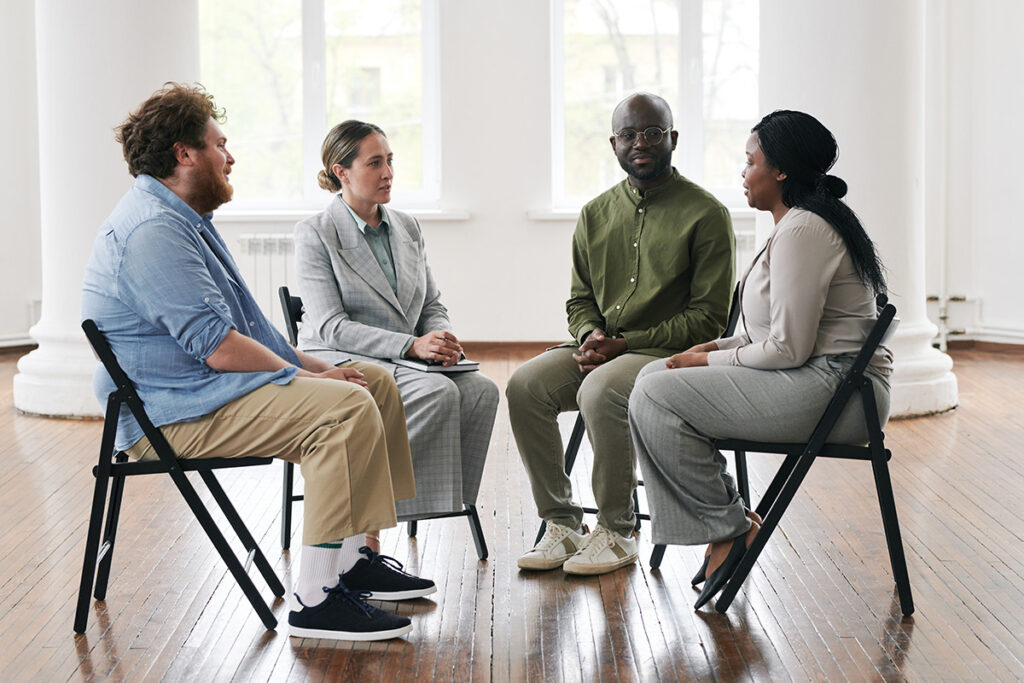Even if you have the best intentions in wanting to help a loved one struggling with a substance use disorder, they may be very resistant. The reality is that not everyone wants to be helped. This is why an intervention may be a good option for those who are more hesitant to get help or even admit they have a problem. An intervention is led by a treatment professional and supported by loved ones in a very structured approach. The therapist or counselor helps lead the conversation and acts as a moderator to facilitate constructive feedback and outcomes. This may be the crucial first step to getting someone you care about help through a professional substance abuse treatment program.
What Is an Intervention?
Simply put, an intervention involves bringing together a group of family and friends who care about a person with a substance use disorder and convincing them to get help. It can be daunting and uncomfortable to try and talk with someone about their addiction.
A professional therapist leads the group in a structured approach with the hopes that the addicted individual will respond to the collective concerns of their loved ones. It isn’t meant to be confrontational. Instead, it’s more informational. The objective? For the person to realize that family and friends care. They should also realize why others have gone to great lengths to help them.
The therapist will also assist the family and friends with how to support their loved one best. This approach makes it less stressful and focused so that it is a positive experience for all involved.
How a Substance Abuse Treatment Program Can Help With Addiction
In addition to helping to plan and execute an intervention, a professional treatment center offers a variety of programs and services to support your loved one as they go through treatment and recovery. The goal of the intervention is to get someone you care about to agree to treatment. With the support of others who have gathered and a professional therapist, you can show them what treatment will look like and how they will benefit from it.
Substance abuse treatment can include programs and services like:
- Residential treatment for more severe addictions
- Intensive outpatient program (IOP) programs to allow flexibility in scheduling therapy
- Aftercare services like sober living and 12-step programming
- Gender-specific programming
- Family therapy
- Dual diagnosis treatment
- Eye movement desensitization and reprocessing (EMDR)
- Cognitive-behavioral therapy (CBT)
- Dialectical behavior therapy (DBT)
- Nutritional counseling
- Experiential therapies that take advantage of the outdoors
- Alumni programs
To find out more about how to best support your loved one, contact a trusted medical professional or speak with a member of the treatment team at a professional treatment center like The Arbor. Each person’s treatment journey is unique and we design each treatment plan to the individual’s unique needs.
Contact The Arbor to Begin a Substance Abuse Treatment Program
The most difficult part for you in helping someone you care about is that they may not want to be helped at all. Making the decision to enlist the help of professionals and stage an intervention will be a hard choice as well. However, but will benefit your loved one in the end.
The Arbor offers a number of treatment options for substance use disorders and co-occurring mental health disorders. More severe addictions may require inpatient treatment with around-the-clock medical supervision, while outpatient care provides more flexible treatment options.
Call the therapeutic team today at 844.413.2690 to learn more about what treatment looks like and how to schedule an intervention. You can also use our online contact form and have someone contact you directly to start the conversation.

